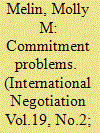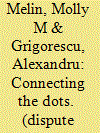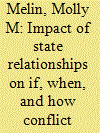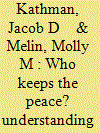| Srl | Item |
| 1 |
ID:
133149


|
|
|
|
|
| Publication |
2014.
|
| Summary/Abstract |
Why do some militarized interstate disputes involve multiple third party attempts to resolve the dispute, while others seemingly end before movement towards peace is possible? This article examines third party commitment to international conflict resolution. I argue that a third party's commitment reflects strategic interests, barriers to entry and the conflict's prospects for peace, which encourage third party involvement while having a dampening effect on their commitment. I also explore the role of bias in management onset and third party commitment. Analysis of conflict management in militarized interstate disputes from 1946 to 2001 offers significant support for the hypotheses.
|
|
|
|
|
|
|
|
|
|
|
|
|
|
|
|
| 2 |
ID:
134462


|
|
|
|
|
| Summary/Abstract |
We explore states’ decisions to escalate disputes over their territorial claims or settle them peacefully. We complement existing arguments by accounting for the fact that states are often simultaneously entangled in multiple territorial claims. We build on previous scholarship in positing that two states involved in a territorial dispute will act based on information they glean from each other’s reputation for dealing with claims with other states and their recent actions involving disputes with other states. Because states know that their actions will impact their adversaries’ calculations, the existence of multiple ongoing territorial claims will act as a deterrent from any type of action to resolve the dispute, whether militarized or peaceful. Our hypotheses therefore consider the impact of the number of states’ other territorial claims as well as the number of their adversaries’ claims. Tests using the Issue Correlates of War data support our arguments.
|
|
|
|
|
|
|
|
|
|
|
|
|
|
|
|
| 3 |
ID:
106928


|
|
|
|
|
| Publication |
2011.
|
| Summary/Abstract |
This paper examines if, when, and how states act to manage militarized disputes. I argue that the relationship between the third party and disputants, the management history, and the characteristics of the conflict help us understand when management occurs and the management techniques employed. I find substantial evidence that biased third parties are quick to offer management services and to employ economic and diplomatic techniques. Conditions that increase the perceived probability of conflict resolution, such as previous conflict management, and factors that lower the cost of conflict management, such as costly conflict, lead to the timely use of diplomatic and verbal techniques. The findings offer significant contributions to both the conflict management and alliance literatures.
|
|
|
|
|
|
|
|
|
|
|
|
|
|
|
|
| 4 |
ID:
153922


|
|
|
|
|
| Summary/Abstract |
Recent research demonstrates that larger and better-equipped United Nations peacekeeping missions more effectively ensure peace and security. This raises an important question: what explains the willingness of member-states to contribute the substantial numbers of troops needed to achieve peacekeeping goals? We argue that narrow member-state security interests offer an important explanation. We find that states embroiled in an ongoing rivalry with another state in the international system contribute more personnel to ongoing missions. Additionally, we find that regimes concerned about coup attempts increase deployments to peacekeeping operations. In a more general sense, this article suggests that the provision of security by peacekeeping operations to their host states is partially dependent upon higher levels of insecurity elsewhere in the international system.
|
|
|
|
|
|
|
|
|
|
|
|
|
|
|
|